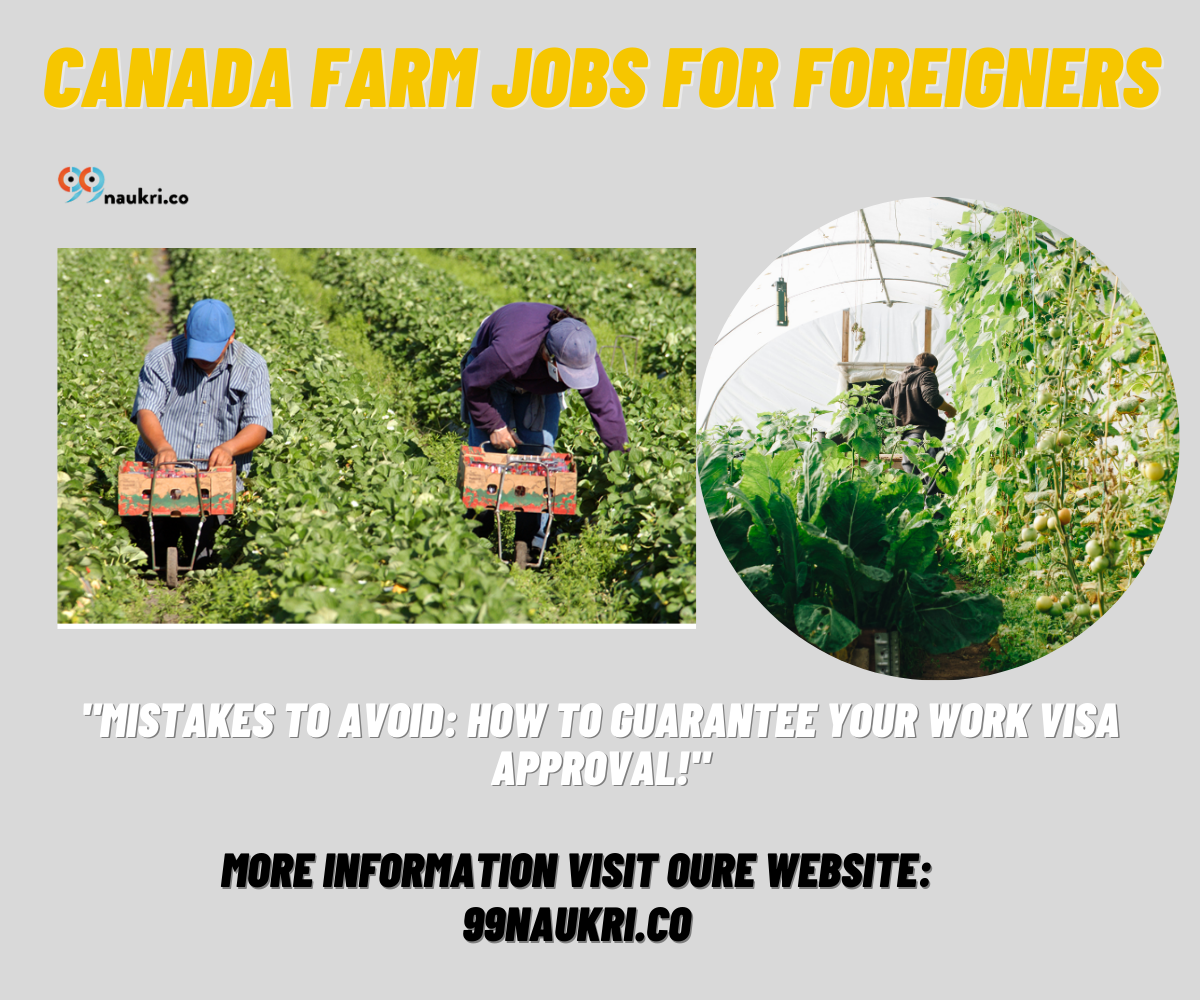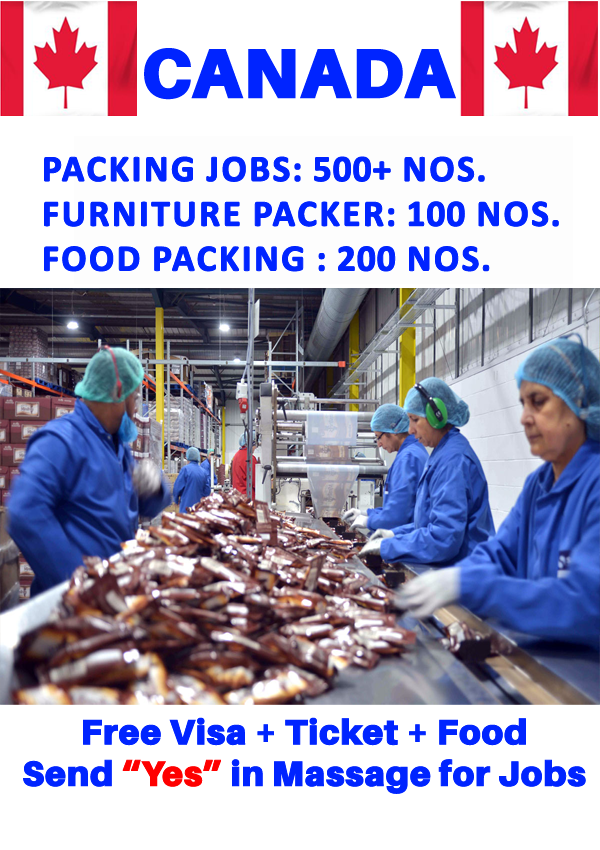Canada Farm Jobs For Foreigners

Canada Farm Jobs For Foreigners
[wp_ad_camp_1]
A blend of diverse cultures, breathtaking landscapes, and economic stability, Canada has always been a dream destination for many. But apart from its scenic beauty and welcoming cities, there’s another aspect of Canada that’s been drawing attention – its thriving agricultural sector. This sector, fueled by vast arable lands and innovative farming techniques, has opened doors for numerous employment opportunities, especially for foreigners.
The rise in demand for foreign farm workers in Canada
Over the past decade, Canada has seen an exponential growth in its agricultural output. To sustain this growth and meet the increasing demands, there’s been a significant rise in the demand for skilled farm workers. However, with a labor shortage in the domestic market, farm owners have turned their gaze outward, looking for passionate and skilled workers from overseas. This international collaboration has proved beneficial for both Canada’s agricultural landscape and foreigners seeking stable and rewarding employment.
The significance of the agricultural sector in Canada
Agriculture isn’t just another industry in Canada; it’s a cornerstone of the nation’s economy. Contributing billions to the GDP, it supports thousands of jobs, both directly in farming and indirectly in related sectors like food processing, transportation, and retail. Canada’s vast landmass offers a variety of crops, ranging from grains in the Prairies, vineyards in British Columbia, to dairy farms in Quebec. As a leading global exporter of products like maple syrup, canola oil, and beef, the country takes immense pride in its agricultural prowess. For foreigners, this signifies not just a job but an opportunity to be part of a legacy.
The pathway to securing a farm job in Canada might seem daunting, especially when you’re miles away. But with the right guidance, determination, and a dash of that Canadian spirit, anything’s possible. As we delve deeper into this guide, we’ll explore the nuances, benefits, and challenges of diving into the world of Canada farm jobs for foreigners.
Eligibility Criteria for Foreign Farm Workers
While Canada is keen on welcoming foreign farm workers, it’s crucial for potential candidates to understand and meet the required eligibility criteria. This ensures a seamless transition for both the employer and the employee, fostering a beneficial and productive working relationship. Below, we outline the key requirements and necessary documentation for those considering this exciting opportunity.
Understanding the Canadian farm job requirements
- Skills and Experience: Before applying, ensure you possess relevant skills and experience in the agricultural domain. Some positions might require expertise in machinery operation, while others could focus on livestock management or crop cultivation.
- Language Proficiency: A basic understanding of English or French is often necessary, as it aids in effective communication with employers and co-workers. Some employers might also provide language training to help bridge any communication gaps.
- Physical Fitness: Farm jobs can be physically demanding. Whether it’s lifting heavy objects, operating machinery, or tending to animals, potential candidates should be prepared for the rigors of farm work.
- Adaptability: Farms in Canada vary in their practices and climate conditions. Being adaptable and open to learning is key to navigating the diverse agricultural landscape of the country.
Necessary documentation for foreigners
- Work Permit: To work in Canada, foreigners typically need a work permit. The type and requirements might differ based on your home country and the nature of the job.
- Temporary Foreign Worker Program (TFWP): Under the TFWP, employers can hire foreign workers to fill temporary labor and skill shortages. The Seasonal Agricultural Worker Program (SAWP) is a part of TFWP that allows the recruitment of foreign workers for seasonal farm jobs.
- Personal Documents: Essential documents include a valid passport, recent photographs, proof of prior work experience, and any educational certifications if relevant.
- Medical Examination: Depending on the country of residence, a medical exam might be required before arriving in Canada.
- Clearance Letters: In some cases, police clearance or background check documents might be requested to ensure the candidate doesn’t have a criminal record.
Securing a farm job in Canada as a foreigner is a structured process. By understanding the criteria and ensuring all documentation is in place, foreigners can embark on an enriching journey, contributing to Canada’s agricultural sector and building a rewarding career.
Apply Also: Cook jobs in Toronto
Benefits of Working in Canada Farm Jobs For Foreigners
Canada’s agricultural sector is more than just vast fields and sprawling vineyards; it’s a realm of endless opportunities. For foreigners, stepping into this domain doesn’t just mean a regular job but an array of benefits that can enhance their professional and personal life. Here, we’ll explore some of the major perks of working on Canadian farms.
[wp_ad_camp_2]
Competitive Wages and Incentives
- Above-Average Pay: Canadian farms often offer competitive wages to their employees. Given the skill shortage in the domestic labor market, farm owners are willing to provide attractive pay packages to draw skilled workers from overseas.
- Additional Benefits: Besides the base pay, many employers offer additional benefits, such as health insurance, paid leaves, and bonuses, making the overall compensation package even more enticing.
- Accommodation and Meals: In several instances, especially in remote farm locations, employers provide free or subsidized accommodation and meals, reducing the living expenses for foreign workers.
- Overtime and Seasonal Bonuses: Depending on the nature of the job and the farm’s requirements, workers might also earn overtime pay during peak seasons, along with potential bonuses for outstanding performance.
Opportunities for Permanent Residency
- Pathway to Canadian Citizenship: One of the most enticing benefits of working in Canadian farms for foreigners is the potential pathway it paves towards permanent residency. Given the significance of the agricultural sector, the Canadian government often prioritizes skilled farm workers in its immigration policies.
- Provincial Nominee Programs (PNP): Several provinces in Canada have their own PNP, wherein they nominate individuals for permanent residency based on the province’s labor market needs. Foreign farm workers, with their valuable skills, often stand a good chance in these nominations.
- Experience Canada Scheme: Foreigners who’ve gained experience working in Canadian farms can leverage this experience to apply for permanent residency under specific immigration streams tailored for skilled workers.
The benefits of working in Canadian farms extend far beyond the paycheck. It’s an opportunity to immerse oneself in the Canadian way of life, understand its agricultural ethos, and simultaneously pave the way for a stable future in one of the world’s most sought-after destinations.
Challenges Faced by Foreign Farm Workers
Embarking on a new journey, especially in a foreign land, is always filled with a blend of excitement and uncertainties. While the prospects of working on Canadian farms are undeniably attractive, like every coin has two sides, there are challenges that foreign farm workers often face. Recognizing and understanding these challenges is the first step towards effectively navigating them.
Adapting to the Canadian Work Culture
- Work Ethics and Practices: Canadian work culture is deeply rooted in punctuality, professionalism, and mutual respect. For foreigners coming from diverse backgrounds, adjusting to these work ethics might take some time.
- Communication Dynamics: Even if one possesses a basic understanding of English or French, the nuances of workplace communication, including idiomatic expressions and colloquialisms, can sometimes be tricky to grasp immediately.
- Team Collaboration: Collaborating with a team comprising individuals from varied cultural backgrounds requires adaptability and open-mindedness. Building trust and camaraderie with fellow workers might take some initial effort.
- Weather Adjustments: For many foreign workers, especially those coming from tropical regions, adapting to the Canadian climate, particularly the cold, can be a challenge. Farm work often requires operating outdoors, making it essential to be prepared for diverse weather conditions.
Coping with Seasonal Employment Fluctuations
- Inconsistent Work Seasons: Agricultural jobs, especially those related to crop cultivation, are often seasonal. There might be times of the year when work is abundant, followed by off-peak seasons with limited to no work opportunities.
- Financial Planning: Due to the seasonal nature of many farm jobs, it’s essential for foreign workers to plan their finances wisely, ensuring they have savings to tide over the lean periods.
- Seeking Alternative Employment: In off-peak seasons, workers might need to explore alternative employment opportunities, which could be outside their domain of expertise or in different regions.
- Visa and Work Permit Implications: Seasonal work can sometimes impact the status of a worker’s visa or permit, especially if there’s a gap in employment. It’s crucial to be aware of the implications and plan accordingly.
[wp_ad_camp_1]
While challenges are an integral part of any journey, they also present opportunities for growth and learning. For foreign farm workers in Canada, every challenge overcome is a step closer to building a successful and fulfilling career in the heart of the Great White North.
Apply Also: LMIA Approved Jobs | Walmart Jobs in Calgary
Application Process for Foreign Farm Workers
Navigating the application process for a farm job in Canada as a foreigner can seem daunting initially. However, with the right guidance and a systematic approach, the process becomes much more manageable. Let’s walk through the steps and key governmental entities involved in this journey.
Step-by-Step Guide to Applying
- Research and Identify Opportunities: Before delving into the application, research the Canadian agricultural sector, understand the types of jobs available, and identify those that align with your skills and interests.
- Prepare Necessary Documentation: Gather all essential documents such as a valid passport, work experience certificates, educational qualifications, and any certifications relevant to the agricultural sector.
- Apply through the Temporary Foreign Worker Program (TFWP): Many foreign farm workers enter Canada through the TFWP. Start by obtaining a positive Labour Market Impact Assessment (LMIA) from a potential employer in Canada.
- Submit Work Permit Application: Once you have a positive LMIA, apply for a work permit through Immigration, Refugees, and Citizenship Canada (IRCC). Ensure all details are accurate and all required documents are attached.
- Await Decision: After submitting the work permit application, there’s a waiting period during which the application is reviewed. Regularly check the application status online.
- Receive Work Permit: Once approved, you’ll receive a Port of Entry (POE) Letter of Introduction and, if applicable, a temporary resident visa to enter Canada. On arrival in Canada, present these documents to the Canadian immigration officials to receive your work permit.
Key Governmental Bodies to be Aware Of
- Employment and Social Development Canada (ESDC): ESDC is the department responsible for the Temporary Foreign Worker Program. They assess the LMIA applications to ensure foreign workers are sought when no Canadians are available for the job.
- Immigration, Refugees, and Citizenship Canada (IRCC): This is the primary body handling immigration matters in Canada. All work permit applications for foreign farm workers are processed by IRCC.
- Provincial Agricultural Departments: Depending on the province you’re aiming to work in, it might be beneficial to familiarize yourself with the respective provincial agricultural departments, as they often have specific programs or resources for farm workers.
- Securing a farm job in Canada as a foreigner is a systematic process, requiring diligence and attention to detail. With thorough preparation and a clear understanding of the procedure, the dream of working amidst the lush Canadian fields is within reach.
[wp_ad_camp_2]
Top Farming Provinces in Canada Farm Jobs For Foreigners
Canada’s vast expanse, diverse climate, and rich soil offer a multitude of farming opportunities. While each province has its unique agricultural strengths, some stand out due to their significant contributions to the country’s farming sector.
Alberta: The Beef Province
- Pioneers of Cattle Farming: Alberta is synonymous with beef production in Canada. The province boasts vast grasslands, ideal for cattle grazing, making it a dominant player in the country’s beef industry.
- High-Quality Produce: Alberta beef is renowned globally for its quality. The rigorous standards maintained by farmers ensure the meat is of top-notch quality, leading to high demand both domestically and internationally.
- Diversified Agriculture: Besides beef, Alberta is also a leading producer of wheat, barley, and canola. The province’s farms benefit from a mix of vast plains and fertile soil, conducive to diverse agricultural practices.
- Economic Impact: The beef industry in Alberta is a significant contributor to the province’s economy, providing employment to thousands and generating billions in revenue.
British Columbia’s Fruit and Wine Haven
- Fruitful Orchards: British Columbia (BC) is Canada’s fruit bowl. The province’s temperate climate is perfect for cultivating a variety of fruits like apples, cherries, blueberries, and grapes.
- Wine Country: The regions of Okanagan and Similkameen are particularly famous for their vineyards. BC wines, especially those from the Okanagan Valley, have garnered international acclaim for their taste and quality.
- Diverse Farming Landscape: Apart from fruits and wines, BC also produces dairy, poultry, and a range of vegetables. The province’s diverse topography, from coastal areas to interior valleys, facilitates varied farming activities.
- Sustainable Practices: BC is at the forefront of organic and sustainable farming in Canada. Many farms adhere to environmentally-friendly practices, contributing to the province’s reputation for clean and green produce.
Both Alberta and British Columbia have carved niches for themselves in the agricultural landscape of Canada. Their respective specializations, coupled with a commitment to quality and sustainability, make them crucial players in the “Canada farm jobs for foreigners” domain.
The Experience of Past Foreign Workers
Every individual who has come to Canada as a foreign farm worker brings with them a tapestry of unique experiences, stories, and lessons. Delving into these narratives provides invaluable insights for newcomers and sheds light on the transformative journey that awaits them in the Canadian agricultural sector.
Success Stories from Diverse Nationalities
- From Mexico to Maple Farms: Juan, a skilled worker from Mexico, began his journey in the apple orchards of British Columbia. With dedication and hard work, he not only became a supervisor but also aided in introducing innovative farming techniques from his homeland, enhancing the farm’s yield.
- The Filipino Dairy Expert: Maria, hailing from the Philippines, where she grew up around livestock, used her expertise to revolutionize a dairy farm in Quebec. Her indigenous knowledge combined with modern techniques propelled the farm to new heights, earning her accolades and eventually, permanent residency.
- The Caribbean Crop Maestro: Leroy, from Jamaica, ventured into the vast wheat fields of Manitoba. With his tropical farming background, he introduced crop rotation practices that significantly benefited soil health, leading to better harvests and recognition in the farming community.
Lessons Learned and Tips for Newcomers
- Embrace the Culture: Many past workers emphasize the importance of being open to the Canadian culture. Participating in community events, local gatherings, or simply engaging in conversations with locals can foster a sense of belonging and make the transition smoother.
- Continuous Learning: The agricultural domain is ever-evolving. Engaging in workshops, training sessions, or even informal knowledge exchange with peers can help in staying updated and enhancing one’s skills.
- Financial Prudence: Given the seasonal nature of many farm jobs, it’s vital to manage finances wisely. Some past workers suggest setting aside a portion of earnings during peak seasons to ensure stability during off-peak times.
- Seek Support: There are numerous communities, support groups, and organizations dedicated to aiding foreign farm workers. Leveraging these resources can provide guidance, address concerns, and offer a platform to share experiences.
The stories and lessons of past foreign farm workers in Canada are testament to the potential, growth, and fulfillment that awaits those willing to embark on this journey. Their experiences serve as both an inspiration and a guide, illuminating the path for future aspirants.
[wp_ad_camp_1]
Programs Supporting Foreign Farm Workers
Canada’s agriculture sector is vast, and to meet its labor demands, the country has instituted specific programs to facilitate and support foreign farm workers. These programs not only provide a structured pathway for workers but also ensure their rights and welfare are safeguarded.
The Seasonal Agricultural Worker Program (SAWP)
- Objective: SAWP was initiated to address the acute labor shortages in the Canadian agricultural sector during peak planting and harvesting seasons.
- Duration and Countries Covered: The program allows foreign workers from select countries, including Mexico and some Caribbean nations, to work in Canada for a period ranging from a few weeks up to eight months.
- Worker Rights: Workers under SAWP are entitled to the same rights and protections as Canadian residents, including minimum wage and workplace safety standards. Additionally, employers are required to provide them with health insurance and suitable accommodation.
- Return Opportunities: One of the standout features of SAWP is that workers can return to Canada in subsequent seasons, making it a popular choice for many foreign farm workers.
The Agricultural Stream of the Temporary Foreign Worker Program
- Scope: This stream is broader than SAWP and caters to high-waged as well as low-waged positions. It’s open to workers from any country, making it more inclusive.
- Requirements: To hire through this stream, employers need to prove that no Canadian citizen or permanent resident is available for the job. A positive Labour Market Impact Assessment (LMIA) is mandatory.
- Duration: The work permits under this program can last up to 24 months. Depending on the nature of the job and the needs of the employer, there might be opportunities for extensions or transitions to permanent residency.
- Worker Protections: Like SAWP, workers under this stream are entitled to health and safety protections, fair wages, and other fundamental rights as per Canadian labor laws.
Both the Seasonal Agricultural Worker Program and the Agricultural Stream of the Temporary Foreign Worker Program reflect Canada’s commitment to supporting its agricultural sector while ensuring the welfare of foreign farm workers. They play pivotal roles in the realm of “Canada farm jobs for foreigners”, offering structured pathways for aspirants seeking opportunities in Canada’s green fields.
Canada Farm Jobs for Foreigners: The Future Outlook
Canada’s agricultural landscape is ever-evolving, shaped by socio-economic dynamics, technological advancements, and global market influences. This impacts the demand and nature of farm jobs for foreigners. Let’s explore the forecast based on the current situation and technological trends.
Predictions Based on the Current Scenario
- Increased Demand: As the global population burgeons, the demand for food products inevitably rises. Given Canada’s vast arable land and agricultural prowess, the country is poised to play a central role in meeting this demand. This translates to a potentially higher demand for farm labor, including foreign workers.
- Diversified Roles: While traditional farming roles will continue to be vital, there’s an expected surge in specialized roles, such as agricultural technology experts, sustainable farming specialists, and agri-business managers.
- More Integration Programs: Given the positive impact of current programs like SAWP and TFWP’s Agricultural Stream, it’s plausible that Canada might introduce more such schemes, tailored to address specific labor needs of the agricultural sector.
Technological Advancements and Their Impact
- Automation and AI: The adoption of automation and artificial intelligence in farming is on the rise. From autonomous tractors to drones for crop monitoring, technology is reshaping agricultural practices. This might lead to a reduced demand for manual labor but an increased need for tech-savvy farm operators and analysts.
- Sustainable Technologies: With the global push towards sustainable farming, technologies facilitating water conservation, organic farming, and renewable energy are gaining traction. Foreign workers with expertise in these domains will likely be in high demand.
- Digital Platforms for Recruitment: We can anticipate the emergence of digital platforms dedicated to connecting Canadian farm employers with foreign workers. Such platforms would streamline the recruitment process, making it more efficient and transparent.
FAQs Canada Farm Jobs For Foreigners
- What qualifications are needed for foreign farm jobs in Canada?
Typically, qualifications vary based on the nature of the job. For general labor positions, practical experience might be more valued than formal education. However, specialized roles, such as agricultural technology experts or farm managers, might require relevant educational qualifications and work experience. - Are there language requirements for foreign farm workers in Canada?
While fluency in English or French can be beneficial, it’s not always mandatory, especially for seasonal or manual labor positions. However, some basic understanding can be advantageous for communication on the job. - How long can foreign farm workers stay in Canada?
The duration varies based on the program. For instance, under the SAWP, workers can stay from a few weeks up to eight months, while under the Agricultural Stream of the TFWP, the permits can last up to 24 months. - Is there a pathway to permanent residency for foreign farm workers in Canada?
Yes, some programs and provincial nominee streams offer pathways to permanent residency for eligible foreign farm workers, provided they meet specific criteria and requirements. - How are foreign farm workers’ rights protected in Canada?
Canada ensures that foreign farm workers are entitled to the same rights as Canadian residents. This includes fair wages, workplace safety standards, health insurance, and other fundamental rights as per Canadian labor laws. - With technological advancements, will there be fewer farm jobs for foreigners in Canada?
While automation and AI might reduce the need for certain manual roles, they will also create opportunities for specialized positions. The demand for labor might shift, but it won’t necessarily diminish. Adaptability and upskilling can be key for prospective workers.
[wp_ad_camp_2]
Conclusion Canada Farm Jobs For Foreigners
Canada’s farming sector, a cornerstone of its economy, presents ample opportunities for foreign workers. From the vast wheat fields of Alberta to the fruit-rich valleys of British Columbia, the nation’s agricultural expanse beckons talent from across the globe. Programs like the SAWP and the Agricultural Stream of the TFWP have played pivotal roles in facilitating this global workforce exchange. As the sector evolves, influenced by technology and global trends, the essence of “Canada farm jobs for foreigners” might transform, but its significance will remain undiminished. For aspirants eyeing this path, the Canadian farms not only offer employment but also experiences that enrich and resonate across lifetimes.





